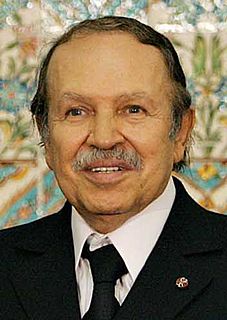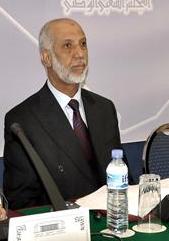The History of Algeria from 1962 to 1999 includes the period starting with preparations for independence and the aftermath of the independence war with France in the 1960s to the Civil War and the 1999 presidential election.

The President of Algeria is the head of state and chief executive of Algeria, as well as the commander-in-chief of the Algerian People's National Armed Forces.

The Democratic National Rally is a political party in Algeria. It is led by the Prime Minister Ahmed Ouyahia. The party held its Second Congress on 15–17 May 2003.

The Movement for the Society of Peace is an Islamist party in Algeria, led until his 2003 death by Mahfoud Nahnah. Its current leader is Bouguerra Soltani. It is aligned with the international Muslim Brotherhood.

The Workers' Party is a Trotskyist political party in Algeria, closely linked with the Independent Workers' Party of France. The party is led by Louisa Hanoune.

The National Liberation Front is a socialist political party in Algeria. It was the principal nationalist movement during the Algerian War and the sole legal and the ruling political party of the Algerian state until other parties were legalised in 1989.

Presidential elections were held in Algeria on 8 April 2004. Incumbent President Abdelaziz Bouteflika was re-elected with 85% of the vote.

Abdelaziz Belkhadem is an Algerian politician who was Prime Minister of Algeria from 2006 to 2008. He was also Secretary-General of the National Liberation Front (FLN). Belkhadem served as Minister of Foreign Affairs from 2000 to 2005 and Personal Representative of President Abdelaziz Bouteflika from 2005 to 2006; after serving as Prime Minister from 2006 to 2008, he was again appointed as Personal Representative of the Head of State in 2008.

Algeria elects on national level a head of state - the president - and a legislature. The president is elected for a five-year term by the people. People's National Assembly has 462 members, elected for a five-year term in multi-seat constituencies by proportional representation. Eight seats in the national assembly are reserved for Algerians abroad. The Council of the Nation has 144 members, 96 members elected by communal councils and 48 members appointed by the president. Algeriawesh alors has a multi-party system, with numerous parties in which no one party often has a chance of gaining power alone, and parties must work with each other to form coalition governments. According to a US Embassy cable, the 2009 presidential elections were "carefully choreographed and heavily controlled", with the official turnout figure "exaggerated" by at least 45%.
Souhane is a small mountain town between Larbaa and Tablat in the wilaya of Blida, Algeria, along the RN 8 highway about 25 km south of Algiers.

The Algerian Civil War was an armed conflict between the Algerian Government and various Islamic rebel groups which began in 1991 following a coup negating an Islamist electoral victory. The war began slowly as it first appeared the government had successfully crushed the Islamist movement, but armed groups emerged to fight jihad and by 1994, violence had reached such a level that it appeared the government might not be able to withstand it. By 1996–7 however it became clear that the violence and predation of the Islamists had lost its popular support, although fighting continued for several years after.
The Algerian Civil War was a conflict in Algeria, starting in 1991 and continuing to a diminished extent up to the present.

The People's National Assembly, abbreviated APN, is the lower house of the Algerian Parliament. It is composed of 462 members directly elected by the population. Of the 462 seats, 8 are reserved for Algerians living abroad. Members of the People's National Assembly are directly elected through proportional representation in multiple-member districts and serve terms lasting five years at a time. The last election for this body was held on 17 May 2017. This body and of the Algerian Parliament is seen as nonrepresentative of the Algerian people's interest because of the presidency, which controls the majority of governmental power. The minimum age required for election into the APN is 28.

The National Assembly is the unicameral legislature of Senegal. The Assembly was previously part of a bicameral legislature from 1999 to 2001 and from 2007 to 2012, with the indirectly elected Senate being the upper house. The Senate was abolished for a second time in September 2012.

The 2002 Algerian Legislative election was held in Algeria on 30 May 2002 to elect members of the People's National Assembly. The governing National Liberation Front (FLN) won a majority of seats in the election. The election suffered from a low turnout, violence and boycotts by some opposition parties.

Parliamentary elections were held in Algeria on 5 March 1982. The country was a one-party state at the time, with the National Liberation Front (FLN) as the sole legal party. The FLN nominated 846 candidates for the 282 seats, with voters asked to express their preference by crossing out names on the ballot. Only 69 of the 136 incumbents who ran for re-election were successful. Voter turnout was 67.34%.

Parliamentary elections were held in Algeria on 26 February 1987. The country was a one-party state at the time, with the National Liberation Front (FLN) as the sole legal party. The FLN nominated 885 candidates for the 295 seats, with voters asked to express their preference by crossing out names on the ballot. Only 67 of the 132 incumbents who ran for re-election were successful.

A legislative election was held in Algeria on 10 May 2012. The incumbent coalition, consisting of the FLN of President Abdelaziz Bouteflika and the RND of Prime Minister Ahmed Ouyahia, held on to power after winning a majority of seats. The Islamist parties of the Green Algeria Alliance lost seats.

The National Rally for Development was a political party in the Comoros.

The Comorian Party for Democracy and Progress was a political party in the Comoros.

















